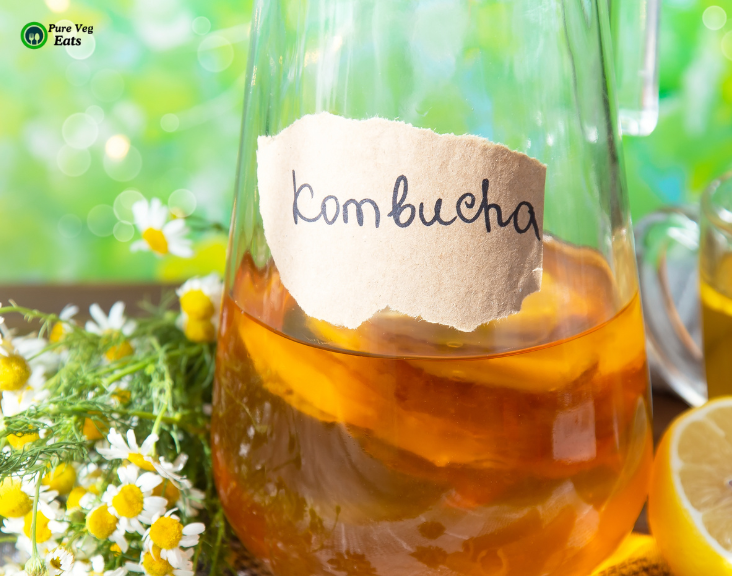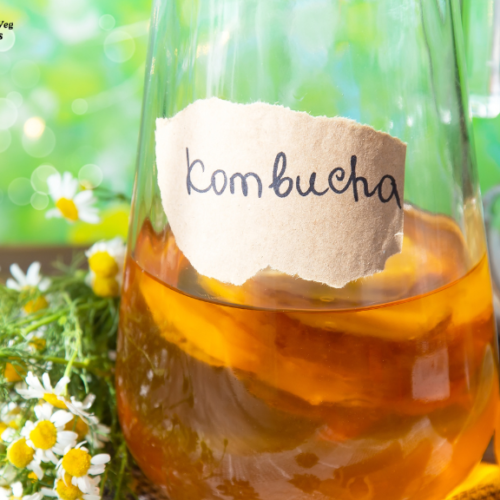Homemade Kombucha Recipe has gained popularity in recent years for its refreshing taste and incredible health benefits. Traditionally made by fermenting tea with sugar and a SCOBY (Symbiotic Culture of Bacteria and Yeast), it results in a fizzy, tangy drink that’s slightly effervescent. For those seeking an alcohol-free version, homemade kombucha is a perfect solution.

It’s a delicious probiotic drink that’s easy to make, with numerous benefits for digestion, gut health, and overall wellness. Whether you’re a kombucha lover or someone curious about its health perks, this alcohol-free recipe offers the same benefits while catering to your dietary needs.

Homemade Kombucha Recipe (Non-Alcoholic)
Equipment
- 1 large glass jar (1-2 gallon capacity)
- A clean kitchen cloth or paper towel (to cover the jar)
- Rubber band or string (to secure the cover)
- Wooden or plastic spoon (for stirring)
- Funnel
- Glass bottles with airtight lids (for storing the finished kombucha)
Ingredients
- 8 cups water (filtered or boiled and cooled)
- 3 tablespoons loose tea (black or green) or 6 tea bags
- 1 cup white sugar or organic cane sugar
- 1 cup plain, unflavored kombucha (as a starter)
- 1 SCOBY (Symbiotic Culture of Bacteria and Yeast)
- Fruits, herbs, or ginger for flavoring during the second fermentation (optional but adds variety)
Instructions
Step 1: Prepare the Tea Base
- Boil the Water: Bring 8 cups of water to a boil.Brew the Tea: Once boiling, remove from heat and add the tea bags or loose tea. Let steep for 5-10 minutes, depending on your preferred strength.Dissolve the Sugar: Stir in 1 cup of sugar while the tea is still hot, ensuring it fully dissolves.Cool the Tea: Let the sweetened tea cool to room temperature. Hot tea will damage the SCOBY, so make sure it's completely cool.
Step 2: Add the SCOBY
- Transfer the Tea: Pour the cooled tea into a large, clean glass jar.Add the Starter Kombucha: Add 1 cup of store-bought kombucha or previously brewed kombucha (this helps jump-start fermentation).Place the SCOBY: Gently place the SCOBY into the jar. It may float or sink—both are fine.
Step 3: Fermentation
- Cover the Jar: Cover the jar with a clean cloth or paper towel and secure it with a rubber band or string. This allows air to circulate while keeping dust and bugs out.Ferment the Tea: Place the jar in a warm, dark area (around 70-80°F / 21-27°C) for 7-14 days. The longer it ferments, the more tangy and less sweet it will become.Taste Test: After 7 days, start tasting the kombucha daily to check its flavor. Once it reaches the right balance of sweet and tangy, it's ready for bottling.
Step 4: Second Fermentation (Optional)
- Flavoring (Optional): If you'd like to add flavor, pour the kombucha into smaller bottles, leaving some space at the top. Add fruit slices, herbs, or ginger to each bottle.Seal and Store: Seal the bottles tightly and allow them to ferment at room temperature for 2-4 days. This process will create natural carbonation, so make sure to burp the bottles (open briefly to release gas) daily to prevent excess pressure buildup.
Step 5: Store the Kombucha
- Refrigerate: After the second fermentation, transfer the bottles to the fridge to stop the fermentation process. Your kombucha is now ready to drink!
Step 6: Maintain the SCOBY
- Save some kombucha and your SCOBY for the next batch. Store the SCOBY in a bit of kombucha in a clean jar, covered, at room temperature.
Notes
Calories & Nutritional Information (per 8 oz serving):
- Calories: 30 kcal
- Sugar: 7-8g (can vary based on the length of fermentation)
- Carbohydrates: 8g
- Other nutrients: Kombucha contains probiotics, acetic acid, and B-vitamins, offering potential digestive and immune benefits.
Why You Should Drink Kombucha Recipe:
Kombucha is much more than just a trendy drink. Here are some compelling reasons why you should incorporate it into your diet:
- Gut Health & Digestion:
Kombucha is rich in probiotics, which are live bacteria essential for gut health. These probiotics help maintain a healthy balance of gut flora, aiding digestion and supporting the body’s immune system. Drinking kombucha regularly may help alleviate common digestive issues like bloating, constipation, and irritable bowel syndrome (IBS). - Rich in Antioxidants:
Made from tea, particularly green or black tea, kombucha is packed with antioxidants that help combat free radicals in the body. These antioxidants protect cells from oxidative stress, lowering the risk of chronic diseases and promoting a healthy aging process. - Detoxifies the Body:
Kombucha contains organic acids and enzymes that promote detoxification. These compounds aid the liver in eliminating toxins and improving liver function. Regular consumption may enhance the body’s natural detox processes. - Boosts Energy Levels:
The B-vitamins and iron released during the fermentation process can give a natural energy boost. These nutrients help increase hemoglobin production, allowing more oxygen to be carried to your cells, thus improving stamina and mental clarity. - Supports Immune Health:
The probiotics in kombucha are also known for their immune-boosting properties. A healthy gut is closely linked to a strong immune system, helping the body to ward off infections and illnesses more effectively.
Health Benefits of Homemade Kombucha Recipe:
- Zero Alcohol Content:
While traditional kombucha may contain trace amounts of alcohol due to fermentation, this alcohol-free version ensures that everyone, including those abstaining from alcohol, can enjoy its benefits. It’s safe for all age groups, including children and those with alcohol sensitivities. - Improved Digestive Function:
Probiotics from homemade kombucha enhance the digestion process by balancing the natural bacteria in the gut. It can help with nutrient absorption and maintaining regular bowel movements. - Promotes Hydration:
Kombucha is a refreshing, hydrating alternative to sugary sodas or caffeine-laden drinks. Drinking it helps maintain hydration levels throughout the day while offering a burst of flavor and health benefits. - Balances pH Levels:
Kombucha can help balance the body’s pH levels due to its slightly acidic nature. A balanced pH ensures optimal body function, reduces the risk of inflammation, and supports overall metabolic processes. - Weight Management:
As a low-calorie, naturally sweetened beverage, kombucha is a fantastic substitute for high-sugar drinks. It helps curb cravings for sweetened beverages and can support weight management goals.
How to Make Homemade Kombucha (Recipe):
Ingredients:
- 4 cups filtered water
- 1 cup organic sugar
- 4 bags of organic green or black tea
- 1 cup unflavored kombucha (as a starter liquid)
- 1 SCOBY (Symbiotic Culture of Bacteria and Yeast)
Instructions:
- Prepare the Sweet Tea:
In a large pot, bring 4 cups of filtered water to a boil. Add 1 cup of organic sugar and stir until fully dissolved. Turn off the heat and steep 4 tea bags for about 10 minutes. Once steeped, remove the tea bags and let the tea cool to room temperature. - Add the SCOBY:
Pour the cooled sweet tea into a large glass jar. Add 1 cup of unflavored kombucha (this will help kickstart fermentation) and carefully place the SCOBY into the jar. Cover the jar with a clean cloth and secure it with a rubber band. - Ferment:
Place the jar in a warm, dark place and let it ferment for 7-10 days. The longer you let it ferment, the tangier it will taste. Taste your kombucha after 7 days to see if it has reached your desired flavor. If you prefer it more tart, allow it to ferment longer. - Bottle the Kombucha:
Once fermented, remove the SCOBY and store it in a little bit of the kombucha for future use. Pour the kombucha into glass bottles, leaving some space at the top. Store the bottles in the fridge to stop the fermentation process and enjoy your homemade kombucha!
Conclusion:
Homemade kombucha without alcohol is a refreshing, nutrient-packed beverage that can significantly improve your digestive health, boost your energy, and enhance your immune system. By making it yourself, you can control the ingredients, ensuring a healthy, alcohol-free version of this popular drink. Whether you’re looking to detox, boost your gut health, or simply enjoy a delicious drink, kombucha is a great addition to a wholesome, plant-based diet.


